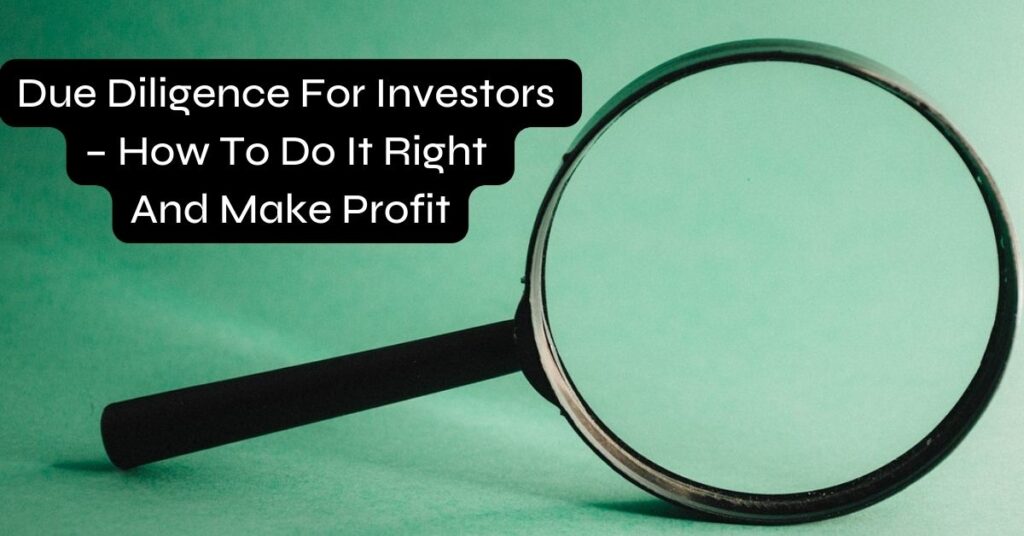An Investment Due Diligence Checklist for Angel Investors and Fund Managers
Most early investors take a shot in the dark, hoping that a company can provide exponential returns and perform well. More times than not these investments fail. Having a successful startup investment portfolio can almost always be directly related to investment due diligence before putting any money down.
Before investing in any tech startup, it’s essential to do your research and look for any red flags that exist.

More times than not a company should give you all the information you need, but a large problem lies within founders hiding information. Before even investing in pre-seed funding or even series A through C, understand what you need from a company to mitigate risk. At the end of this article, we give some valuable insight into tools that can completely omit this problem.
This means taking a close look at the company’s financials, business model, competitive landscape, and other qualitative comparisons to determine if the investment is “right for your portfolio”. While no two startups are alike, there are certain key factors that all investors should consider.
To help you get started, we’ve created a due diligence checklist for startup investments, specifically in technology. This list covers all the basics, from evaluating the business model to assessing the competitive landscape. Of course, every investor has personal and sometimes unique criteria for what makes a good investment; this list is a great starting point for anyone looking to put money into a startup company, regardless of portfolio size.
So what are you waiting for? Here’s our expert-guided due diligence checklist, one step closer to making a profitable tech startup investment.
Financial Analysis
When it comes to analyzing the financials of a startup, there are a few key things you need to look for. Since you’re directly giving a piece of your finance, make sure you receive all the info on the company’s back.
Is the company growing?
The most important thing is to make sure the company is generating revenue and that it is growing at a healthy rate. Growth is a key factor to knowing a company is generally optimizing overall business development and has a grasp. You also want to make sure the company is not spending too much money, and that it has a solid financial cushion in case of tough times.
Is the company profitable?
The problem with growth is that it is not always scalable. Simply looking at the company’s revenue growth is not enough; you also need to consider other factors such as how much money the company is spending and its overall financial health. If a company is growing rapidly but is not profitable and is burning through cash, that’s a red flag and you should stay away. Conversely, if a company is not growing as quickly as you would like but has a solid financial foundation, that may be a better investment opportunity.
Company margins can be great indicators of whether or not the business is sustainable in the long run. If a startup is losing money, that’s usually a sign that it’s not doing well and could be in trouble, but that is not the end of the deal. Capital (your investment) could be all the company needs. With a solid foundation of people & product capability, you could be the one thing the company needs to take off!
Company founders
Finally, you want to look at the founders of the company and see if they have a good track record when it comes to finances. If they’ve been involved in previously failed startups, that’s usually not a good sign. So overall, there are a few things you should look for when analyzing a startup’s financials. By keeping an eye on these factors, you’ll be able to tell if a company is headed in the right direction financially or not.
Statistics & Documentation
You should be provided documentation that is relevant to everything here but it’s imperative to know what you’re getting. Always ask for a full breakdown of the company’s financial history, as we covered; one of the most important parts of due diligence as an investor.

Certain terminology can differentiate between investors and founders, so make sure to be clear. This will give you a good idea of the company’s obligations, debt, cash flow, statements, etc.
Obligations: This refers to the money that the company owes to creditors and other lenders. It’s important to keep an eye on this number, as it can give you a good idea of the company’s financial health.
Debt: This is the money that the company owes to its lenders (you don’t want them to stay here, or you won’t be profitable)
Also look at current equity, cash flow, bank statements, and other key indicators of financial health.
Market Status
When you’re considering investing in a startup, it’s important to take a close look at the market that the company is operating.
Is the general market growing? A typical indicator a steady year-over-year growth without decline results (separate from overall market performance)
You want to make sure that the existing market is doing well and that there is potential for growth. For example, if the company is in the technology sector, an overall global financial crisis may affect market performance more drastically in tech than others. Look for consistent growth over years and a promising market.
Here are a few things to look for when you’re analyzing the market of your next startup investment:
How’s the competition?
When you’re evaluating a startup as a potential investment, it’s important to take a close look at the competition. After all, you want to make sure that your money is going into a company with a unique product or service that can stand out in the marketplace. If the startup’s product is extremely similar to an existing product that has a large market share, you’ll need to dive into a deeper analysis of what the startup offers.
One way to filter the competition is by looking at their marketing materials.
Ask yourself (or your marketing specialist):
- Do they have a strong branding strategy?
- Are they active on social media and other channels?
- What do their customers say about them?
When looking to invest in a startup, it is important for investors to conduct due diligence and create a checklist of items they want to assess before making a decision.
It’s now more important than ever to analyze key areas that should be considered when analyzing a startup, from cash flow and market analysis to brand capability and competitive landscape. By taking the time to understand all aspects of the business, investors can make more informed decisions about where to put their money. And with so many startups out there vying for attention, doing your homework is more important than ever.
An alternative to doing your own due diligence:
Startup investment platforms can help you do this entire process and more by breaking down the best opportunities and doing due diligence for you. With expert guidance and advanced analysis technology, they visualize investment opportunities on a dashboard, so you can easily see filter, and manage your investments.
From angel investors to large venture capitalist firms, a startup investment platform is a key to managing multiple large and small investments.








